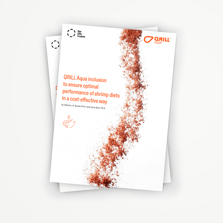What India Wants To Know About Krill: The Top 5 Questions
India asked, and we answered. Here are the top five most-asked questions from our India-based partners and customers about our krill meal products. Below, you’ll find our answers, ranging from the processing of krill to the scientific evidence behind krill meal’s benefits. Read on to get the answers to your common krill questions.
1. How is the krill meal processed, and is it sustainably sourced?
Krill from Aker QRILL Company is harvested using a gentle and eco-friendly harvesting technology. It is immediately processed on the vessel into a super fresh, high-quality meal, which is vacuum-packed on board. Resulting in a high quality krill meal.
The krill fishery is one of the most highly regulated fisheries. Aker QRILL Company’s activities are MSC-certified with a very good score, and the company’s harvesting is certified by Friend of the Sea. The fishery is governed by CCAMLR, a commission that oversees all activities in the Antarctic. The management of the krill fishery is science-based, and the quota is set to a precautionary level of less than 1% of the estimated biomass. In addition, the krill fishery has received an ‘A’ rating by the Sustainable Fisheries Partnership several years in a row.
2. Is Aker QRILL Company’s krill meal free from contaminants such as heavy metals or pesticides? And are there any additives, such as preservatives, in the meal?
Our krill is harvested from the pristine waters of the Antarctic and does not contain heavy metals or pesticides. The krill meal is tested for environmental pollutants to ensure the purity of the product.
Aker QRILL Company’s krill meal is an all-natural product, with no additives. The biggest contributor to degradation of krill meal is oxidation. Krill meal is rich in polyunsaturated fatty acids (PUFAs), which are sensitive to oxygen, and krill is naturally high in astaxanthin, which is a powerful antioxidant. We package our krill meal in Modified Atmosphere Packaging (MAP) in combination with high-quality packaging materials. When packing krill meal in MAP, the oxygen-rich atmosphere in the bag is replaced with pure nitrogen, minimizing the chance of oxidation.
3. What is the best way to store krill meal to maintain its quality, and what is its shelf life?
To preserve the quality of krill meal, we recommend that it is stored at room temperature in its original packaging. Large fluctuations in temperature should be avoided, and storing large quantities outside of the packaging should be limited. The typical shelf life of a package of krill meal is two years. After two years, the meal can be re-tested and receive a shelf-life extension of six months.

4. In terms of cost, how does krill meal compare to other feed ingredient options?
Krill meal is a premium feed ingredient intended for use at lower inclusion levels, and it is priced as a premium ingredient. It is a potent feed attractant packed with many beneficial nutrients, including EPA and DHA, bioavailable proteins and amino acids, vitamins and minerals. QRILL Aqua can serve as a replacement for other costly ingredients due to its significant nutritional value, which can enhance cost efficiency of the feed overall. Scientific trials have shown that krill improves growth performance, feed utilization, and offers health benefits of the animals consuming it, which in turn improves the ROI for the farm.
5. Is there any scientific evidence to support the nutritional value and health benefits of krill meal for animals?
Yes, krill meal has been proven to offer health benefits in many farmed animals, with more than 150 scientific peer-reviewed studies supporting these claims. Health benefits have been demonstrated in many species including shrimp, salmonids, marine fish, dogs, and horses, studied in various trials. These documented benefits include improved growth performance, better feed utilization, enhanced disease resistance, better survival rates, and overall improved animal health and welfare.
Read also: "5 most frequently asked questions about krill in Europe."
Krill in shrimp feed

